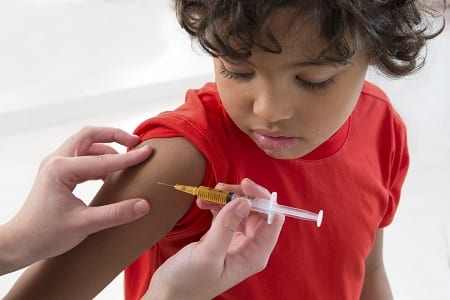 It’s back-to-school time. And that means checklists: Books and supplies; new outfits or uniforms; lunchboxes, backpacks and thermoses. There are so many things to remember when getting your child ready for the first day of a new school year.
It’s back-to-school time. And that means checklists: Books and supplies; new outfits or uniforms; lunchboxes, backpacks and thermoses. There are so many things to remember when getting your child ready for the first day of a new school year.
But what about immunizations? Did you make sure that your child’s vaccines are up-to-date?
August is National Immunization Awareness month. And while there has been much debate over the past several years on the safety of immunizations, pediatricians are making great strides to educate parents on the importance of keeping children up-to-date with vaccines before heading back to school.
“In the pediatric community we care about kids and want them to be healthy,” said Dr. Ann-Christine Nyquist, a member of the American Academy of Pediatrics Committee on Infectious Diseases. “But the challenge has been that sometimes the media focuses more on the risks of vaccinations, rather than the benefits and forgets about the very real risk of vaccine preventable disease.”
Dr. Greg Savel, a pediatrician at Myrtle Avenue Pediatrics in Clearwater and an expert on addressing vaccine hesitancy among parents of infants and young children throughout the state of Florida, has spent the past 25 years educating parents on the importance of immunization.
One of the most common concerns among parents is “too many shots too soon.”
Savel, the 2015 recipient of the CDC Childhood Immunization Champion Award for the state of Florida, an award that honors individuals who are doing an exemplary job or going above and beyond to promote childhood immunizations in their community, said that parents should not be concerned.
“Parents should understand that by taking their children to the grocery store they are exposing them to thousands of germs in every aisle, which is significantly more than when their child goes to the pediatrician and receives multiple immunizations at once,” said Savel.
Nyquist agrees that parents should not worry. “No one has identified any harm by getting the vaccinations all together at one time.”
In fact, there is a method behind the madness. “The timing of the vaccines is critical for the child to create a good immune response to protect them against the diseases they are going to see at that age,” Nyquist explained.
Another concern that parents often have is the use of Thimerosal (a preservative that contains a form of mercury) as an additive in vaccines. Some parents worry about a potential link between Thimerosal and health problems, particularly autism, a common developmental disability affecting an estimated 1 in 150 children.
While Thimerosal has been taken out of most vaccines, some of the multiple dose vaccines have a small dose, said Nyquist. “But it’s not the mercury that is found in fish, so this is not mercury poisoning.”
The MMR (measles, mumps, and rubella) vaccine is one vaccination, in particular, that has caused much debate among parents.
Because celebrities have spoken out against the MMR vaccine and anti-vaccination websites and articles with false or outdated information have been posted stating that the measles component of the vaccination caused autism, parents are skeptical about saying “yes” when it comes to giving their child this vaccine.
“There have been multiple studies and analyses that this is not true,” says Nyquist.
The Institute of Medicine and the AAP have organized several panels of independent scientists to study MMR and autism, according to the American Academy of Pediatrics. All studies concluded there was no association between the two.
A yearly dose of the flu vaccine is also often questioned by parents. But with the alarming statistic that 59,000 unimmunized people died from the flu this year, Savel said that parents should seriously consider vaccinating themselves and their children. “It makes you a good citizen to get the flu vaccine,” Savel said.
“Those who choose not to immunize themselves or their children pose a risk to those who are poorly immunized or who might have a compromised immune system because of chemotherapy or other medical conditions,” Savel continued. “Therefore, the trip to a grocery store could be hazardous to the health of someone with a poor immune system because of possible exposure to those who choose to not be immunized.”
Nyquist knows that it can take a lot of time for concerned parents to know what is best for their kids.
“It’s hard to deal with the information age to make sure that things are up-to-date and accurate.”
But parents should take the time to do the fact checking, said Nyquist. It can sometimes be a challenge, but knowing about the benefits of immunization is important.
To check that your child is up-to-date with vaccinations according to his or her age, visit www2.aap.org/immunization/izschedule.html.
Chrissie Ferguson is a freelance writer and the mother of three young boys. She is also a middle school English teacher at Rosarian Academy in West Palm Beach. Read her mom blog at soundoflittlefeet.blogspot.com.

Comments